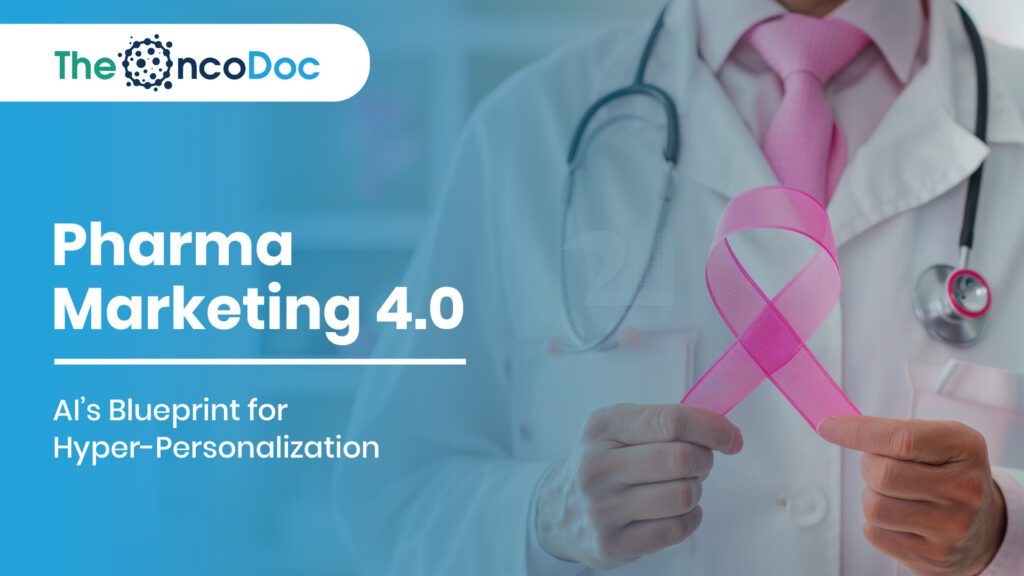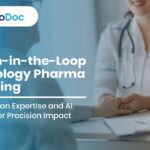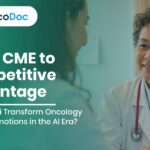Introduction: AI as the New Marketing Catalyst
The pharmaceutical industry is undergoing a seismic transformation. Traditional mass marketing campaigns, once focused on large-scale physician outreach and generic product promotions, are giving way to hyper-personalized, data-driven strategies. Artificial intelligence (AI) has become the driving force behind this shift, enabling marketers to precisely target healthcare professionals (HCPs), patients, and caregivers with relevant, timely, and impactful messaging.
In oncology, where every decision can alter a patient’s life trajectory, AI-powered marketing offers unprecedented opportunities. It helps marketers decode complex datasets, predict patient needs, and create tailored communication strategies that resonate at an individual level. By integrating advanced analytics, machine learning (ML), and natural language processing (NLP), pharma companies are moving from reactive to proactive marketing models, where insights fuel interactions rather than merely reporting them.
This article explores how AI is redefining oncology marketing strategies, replacing outdated one-size-fits-all campaigns with precision-focused micro-marketing initiatives, and shaping a future of ethical, empathetic, and efficient communication.
1. From Mass Campaigns to Micro-Targeting: A Paradigm Shift
Pharma marketing traditionally relied on broad audience segmentation, grouping HCPs or patients by basic demographics like location, age, or specialty. AI has revolutionized this process by identifying deep behavioral patterns and creating micro-segments that go far beyond surface-level categorization.
AI-driven micro-targeting leverages prescription trends, digital footprint analysis, patient treatment timelines, and even social sentiment data to deliver contextually relevant messaging. For instance:
- Oncology HCP Segmentation: Algorithms group oncologists based on clinical trial participation, publication history, and patient case loads.
- Patient Micro-Clustering: Cancer patients can be segmented into sub-cohorts, such as “early-stage breast cancer patients exploring genomic testing,” enabling precise educational outreach.
Micro-targeting also allows for dynamic audience reclassification, as a patient progresses through treatment or an oncologist adopts a new therapy, content delivery adapts in real-time. This eliminates wasted outreach and ensures messaging is timely, actionable, and supportive.
2. Generative AI and Scalable Personalization
The advent of generative AI tools has empowered pharma teams to produce customized content at scale. Marketing no longer depends on static campaigns or generic brochures. AI systems can generate multiple versions of emails, social media content, or physician detailing messages within minutes, each tailored to the recipient’s clinical focus or information preferences.
Examples include:
- HCP Outreach: AI can create individualized product updates for surgical oncologists, radiation specialists, or hematologists, ensuring that each physician receives the most relevant information.
- Patient Support: Cancer patients may receive chatbot-driven emotional support messages and practical tips that align with their treatment regimen.
- Localized Campaigns: AI tools automatically translate and adapt content for regional audiences, integrating cultural sensitivity to enhance comprehension and trust.
Generative AI has redefined pharma’s role, making companies not just suppliers of drugs but partners in knowledge delivery and care navigation.
3. AI-Powered Engagement for HCPs
Oncologists face overwhelming data overload due to rapid drug innovation, genomic testing breakthroughs, and new therapy approvals. AI-driven engagement tools provide clarity and decision support by summarizing vast clinical research into digestible formats.
- AI Answer Engines: Provide oncologists with real-time responses to clinical queries, referencing peer-reviewed publications, FDA updates, and trial results.
- Predictive Alerts: Identify shifts in prescribing behavior or new disease trends, prompting pharma reps to deliver timely updates.
- Precision Detailing: Digital reps armed with AI dashboards can personalize discussions, focusing on therapies or diagnostics that align with the oncologist’s patient population.
This shift marks a departure from transactional detailing to strategic engagement where pharma becomes a trusted partner in care delivery.
4. Patient-Centric Marketing with AI Tools
For patients navigating a cancer diagnosis, access to accurate, timely information is as crucial as treatment itself. AI-driven tools elevate pharma’s role in patient support:
- AI Chatbots: Provide patients with personalized medication reminders, side-effect management strategies, and local support group recommendations.
- Virtual Assistants: Help caregivers track appointments and therapy timelines, reducing treatment adherence gaps.
- Emotional Analytics: AI algorithms detect stress or fear in patient communications, allowing companies to design more empathetic campaigns.
By aligning marketing strategies with patient well-being, pharma brands enhance trust and emotional resonance, transforming their image from sellers to care advocates.
5. Data Integrity, Ethics, and Trust in AI-Driven Marketing
The value of AI lies in its ability to analyze massive datasets, but this power comes with heightened responsibility. Oncology marketing involves sensitive patient health information (PHI), necessitating robust data governance measures.
Key challenges include:
- Privacy Compliance: Adherence to HIPAA, GDPR, and regional privacy laws.
- Bias Mitigation: Algorithms must be trained on diverse datasets to avoid bias in treatment recommendations or marketing strategies.
- Transparency: Explainable AI (XAI) ensures oncologists understand the rationale behind AI-generated insights.
Pharma brands that invest in ethical AI frameworks will gain competitive advantage, as trust becomes the ultimate currency in healthcare marketing.
6. Omnichannel AI Ecosystems
Modern oncology marketing isn’t limited to emails or rep visits; it’s an integrated ecosystem. AI coordinates messaging across multiple touchpoints:
- Personalized email campaigns targeting oncologists with trial data.
- Social listening tools monitoring patient discussions to design myth-busting campaigns.
- Interactive in-clinic kiosks offering screening education.
AI ensures that messaging is consistent across all channels, reinforcing brand credibility and reducing message fatigue.
7. Predictive Analytics for Market Anticipation
Instead of responding to demand, AI allows marketers to anticipate it. Predictive analytics identifies future opportunities by analyzing:
- Regional cancer prevalence trends.
- Patient search patterns indicating early symptom concerns.
- Physician behavior shifts, such as increased diagnostic test requests.
Pharma brands can preemptively launch educational campaigns in high-risk regions, improving early diagnosis and building stronger local brand presence.
8. AI-Driven Campaign Performance Measurement
Traditional KPIs, click rates and impressions, are insufficient in oncology. AI provides health-impact-driven metrics, such as:
- Number of screenings booked post-campaign.
- Early detection rates linked to marketing interventions.
- Emotional sentiment improvements in patient communities.
These KPIs reflect marketing’s role in saving lives, not just selling treatments.
9. Localization and Vernacular Strategies with AI
In diverse regions, localized content drives deeper engagement. AI-powered translation tools go beyond literal translation, adapting cultural nuances and medical literacy levels:
- In South Asia, AI-generated infographics in regional languages increase screening awareness.
- In Africa, AI chatbots communicate through local dialect voice interfaces, breaking literacy barriers.
This hyperlocal focus ensures that oncology marketing reaches underserved communities and reduces health disparities.
10. Virtual and Augmented Reality for Education
AR/VR experiences are increasingly used in oncology marketing to:
- Simulate how targeted therapies work on tumors at a cellular level.
- Train oncologists on rare procedures.
- Help patients visualize treatment journeys to reduce anxiety.
These immersive tools, powered by AI insights, enhance comprehension and patient confidence.
11. Collaborating with Digital Opinion Leaders (DOLs)
AI helps pharma identify influential oncologists, patient advocates, and community leaders online. DOL partnerships drive more authentic engagement than traditional advertising because these figures bridge the trust gap between patients and pharma brands.
AI monitors audience reactions to refine collaboration strategies, ensuring credibility and transparency in sponsored content.
12. Emotional Marketing: Data Meets Empathy
Marketers can develop emotionally compelling advertisements with the use of AI sentiment analysis. For instance, campaigns focusing on survivorship stories outperform those that emphasize statistics alone. AI-driven emotional mapping ensures messaging reduces fear and stigma, making oncology discussions more approachable.
13. Wearable Data and Real-Time Marketing
With patient consent, wearable devices provide AI-powered insights into health behaviors. Marketers can use anonymized data to design preventive campaigns:
- If data shows increased sedentary behavior in cancer survivors, a wellness campaign promoting movement and recovery support can be launched.
- Sudden changes in sleep patterns may trigger mental health resources outreach.
This real-time data loop positions pharma brands as proactive health partners.
14. Automation in Campaign Optimization
Machine learning enables continuous A/B testing at scale. Campaigns are automatically adjusted based on engagement, regional uptake, and feedback sentiment. AI-driven campaign optimization improves cost efficiency and ROI, freeing marketers to focus on creativity and strategic decision-making.
15. Ethical AI Regulations and the Pharma Landscape
Regulatory agencies like the FDA and EMA are racing to create guidelines for AI use in healthcare marketing. These frameworks aim to ensure:
- Patient consent for data usage.
- Clear disclaimers on AI-generated recommendations.
- Regular auditing of AI marketing platforms for compliance.
Pharma companies embracing regulation proactively will be seen as ethical innovators.
16. Building Digital Twins for Oncology Patients
AI now powers digital twins, virtual models of a patient’s health profile. Marketing teams can use aggregated, anonymized twin data to predict content needs at each stage of care. For example, a digital twin may predict that patients undergoing second-line therapies require psychological support messaging.
This futuristic approach enables patient-centric marketing journeys aligned with treatment milestones.
17. AI in Clinical Trial Recruitment Marketing
Oncology trial participant recruitment is a recurring problem. AI streamlines this by analyzing EMRs, social media activity, and patient registries to identify eligible candidates. Personalized invitations and educational campaigns are then deployed to increase trial enrollment rates.
This dual benefit accelerates drug development and provides patients access to cutting-edge therapies.
18. Future Vision: AI as a Strategic Partner
The coming decade will see AI evolve from a support tool into a strategic decision-maker in pharma marketing:
- Predictive AI will identify future drug adoption trends years before launch.
- Generative AI will automate campaign production with near-zero lag.
- AI ethics boards will ensure fair, unbiased healthcare messaging.
Pharma’s role will expand beyond medicine distribution to lifelong health engagement, supported by AI-powered precision marketing.
19. Hyper-Personalized Education Journeys for HCPs
With oncology treatments evolving rapidly, education has become a cornerstone of pharma-HCP engagement. AI is enabling personalized learning pathways that adapt to the unique needs of each oncologist, nurse practitioner, or primary care provider.
AI-powered content recommendation engines can map a physician’s specialty, past prescription data, and learning preferences to deliver just-in-time training modules. For instance:
- Radiation Oncologists may receive in-depth 3D tumor visualization training for precision radiotherapy.
- Community Oncologists could be offered localized patient case studies relevant to their region’s cancer prevalence.
- Pharmacists can access concise drug interaction summaries to assist with polypharmacy management in oncology care.
These adaptive learning ecosystems transform pharma into a partner in lifelong medical education, fostering deeper brand loyalty and ensuring practitioners remain up-to-date without information overload.
20. AI-Driven Community Insights and Grassroots Campaigns
AI is now being used to analyze geospatial health data and social determinants of health (SDOH), helping pharma identify cancer care gaps at the community level. By integrating datasets from local hospitals, screening camps, and social health records, marketers can design hyperlocal campaigns that resonate with underserved populations.
For example:
- Regions with high tobacco consumption rates can be targeted with culturally tailored oral cancer awareness drives.
- AI can detect communities with low mammography uptake, prompting mobile screening units and localized digital campaigns.
- Rural areas with limited oncologist access can benefit from AI-powered telemedicine awareness campaigns.
This approach goes beyond marketing to actively reduce healthcare inequities, positioning pharma brands as advocates for early detection and equitable care delivery.
21. Intelligent Content Lifecycle Management
The sheer volume of content required for oncology marketing is staggering, especially when addressing diverse stakeholders like oncologists, nurses, caregivers, and patients. By automating content versioning, compliance checks, and dissemination, artificial intelligence streamlines content workflows.
Through AI-driven content lifecycle platforms, pharma teams can:
- Automatically update drug safety labels across all digital assets when new FDA guidelines are released.
- Repurpose content for multiple channels, such as converting a scientific poster into a patient-friendly infographic.
- Ensure compliance at scale, with AI algorithms scanning all material for regulatory adherence before publication.
This reduces operational inefficiencies and ensures that messaging is accurate, timely, and relevant.
Conclusion: AI as the Engine of Trust and Transformation
Artificial intelligence is no longer an experimental tool in pharma marketing, it is a strategic imperative. From micro-targeting HCPs with real-time clinical insights to empowering patients with personalized care navigation, AI ensures that every message serves a purpose beyond promotion.
The future of oncology marketing lies at the intersection of empathy and intelligence. Companies that invest in ethical AI frameworks, transparent data practices, and hyperlocal outreach will become trusted partners in cancer prevention and treatment.
As AI-driven analytics, generative content, and predictive models mature, marketing will evolve into a healthcare ecosystem where every touchpoint is tailored, impactful, and life-enhancing. Pharma brands that embrace this transformation will not only gain competitive advantage but also accelerate early detection, enhance treatment adherence, and support survivorship journeys, achieving a true shift from mass campaigns to meaningful micro-interventions that save lives.
The Oncodoc team is a group of passionate healthcare and marketing professionals dedicated to delivering accurate, engaging, and impactful content. With expertise across medical research, digital strategy, and clinical communication, the team focuses on empowering healthcare professionals and patients alike. Through evidence-based insights and innovative storytelling, Hidoc aims to bridge the gap between medicine and digital engagement, promoting wellness and informed decision-making.



